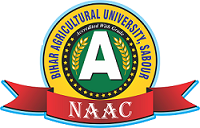About Kisan Choupal
Mandates of Kisan Choupal
Process of Conducting Kisan Choupal at Farmers Doorsteps
The principal characteristic of Kisan Choupal is to establish better interaction with the farmers in discussing their problems and to provide best-suited solutions together with imparting need-based training on various issues of agriculture and allied areas by a team of scientists from the colleges/KVKs of the varsity. All the KVKs and colleges follow the following steps for conducting Kisan Choupal :
Survey of village and mobilization of community
Site selection is important to the Kisan Choupal because of the various factors that have to be considered. The site is selected by a team of multidisciplinary scientists who visit the village a day before the date of the Choupal to ensure active mobilization/ participation of the villagers. The villagers are motivated to get their farmingrelated problems solved at their doorsteps. The motivational activities like focus group discussion (FGD), advertisement, event brochure and interaction with key communicator are planned to ensure maximum participation. Also, the linkage with state agriculture department and line departments is ensured to connect to the villagers for better access to schemes and facilities (Kumar et al., 2013). During the selection of villages, priorities are given to the resource poor families dominated community and/or location.
Need assessment/Situation analysis
Participation is now widely advocated and documented as philosophy and mode in extension and/or development (Cemea, 1985), but the gap remains wide between fashionable rhetoric and field reality (Chambers, 1994). A team of scientists try to use a practical set of approaches under this programme for understanding their needs and agro-ecological situations, for example, FGD, rapid rural appraisal (RRA), participatory rural appraisal (PRA) and field visit. The Kisan Choupal is being conducted in the identified villages on the basis of need assessment of the farmers by the scientists on agriculture and allied enterprises. The training needs assessment will enable the scientists to have a better knowledge of the management practices of the farmers, and the constraints that need to be addressed in the area where the Kisan Choupal will be taking place.
Preparation of teaching materials and modules
Developing and using effective written and audio-visual materials is an integral part of Kisan Choupal. Training materials are always based on the availability of resources at village level, background of the farmers and need of the farmers.
Implementation of Kisan Choupal
Every Kisan Choupal is implemented by a team of multidisciplinary scientists and the dialogue/discussion/ problems solving is facilitated with the display of technical videos/movies at the beginning of the Choupal. In addition, the distribution of farmerfriendly publication of the university during the Choupal is ascertained to increase awareness on cropping practices and new techniques for the literate farmers. For making Kisan Choupal more effective, animal camps are also organized.
Feedback/Suggestions
The documentation of farmers’ feedback is put to practice together with regular reports to the varsity which is utilized as an input for future research problem setting. It is proved of immense importance not only to the farmers but also to the studentsl who have gained immensely from this platform by getting real-life field exposure in the villages. This is a unique programme for a reversal of learning: to learn from rural people, directly, on the site and face to face, gaining from local physical, technical and social knowledge (Chambers, 1994).








